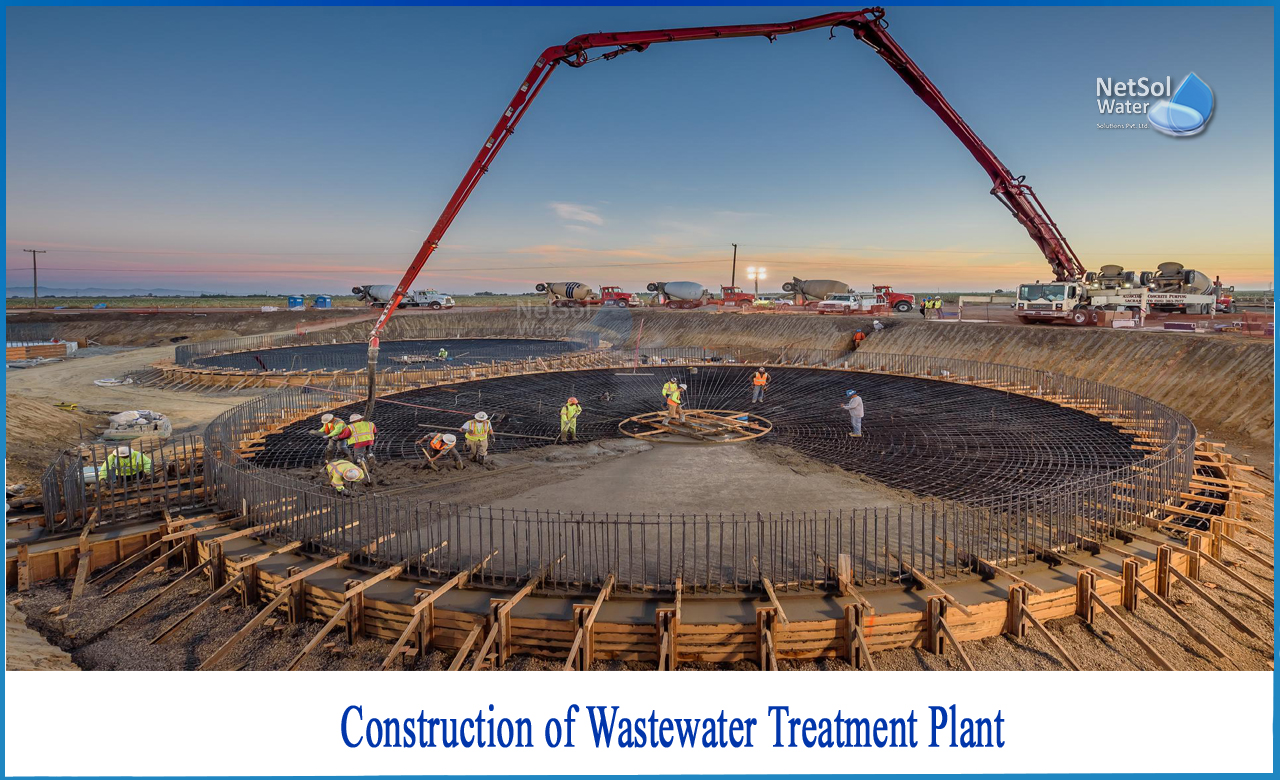What is Wastewater treatment?
Wastewater treatment is the process of removing impurities from wastewater and converting it into effluent that may be recycled back into the water cycle. Once returned to the water cycle, the effluent has a low environmental impact or can be reused for a variety of purposes (called water reclamation). A wastewater treatment plant is where the treatment takes place. Various types of wastewater are treated at wastewater treatment plants of the proper type.
How do you construction of wastewater treatment plant?
Steps of construction of wastewater treatment plant
There are five main steps to each wastewater building project. It all starts with preliminary study and project design, then moves on to obtaining land, permits, construction, and testing.
1: Initial research
There is a requirement for research before every wastewater treatment plant project. Available finances from grants, loans, and other sources must be investigated. The capacity required by the designed system must be given. If the plant is expected to supply 35,000 homes and companies, there is a need to consider the area that is now being built. It will be necessary to speak with municipal administrators and zoning boards to determine what development targets have been set.
It's best to plan bigger than you think. You'll need to prevent having a system that's overburdened and in need of updates before you've paid off any loans and can comfortably afford upgrades without significantly raising fees or taxes. Burning the leftover solids can help you save money on your heating bills. If a connection to the local power grid is required, be sure you've discussed costs and how to extend lines from the nearest poles and substation to your new plant with them.
It will be necessary to determine whether the optimum access locations are main roads, as well as conduct traffic studies to determine whether the increased traffic will cause traffic congestion. It is necessary to ensure that vehicles transporting garbage from septic-system-equipped residences and businesses are not overweight.
2: Project planning
Knowing the project's objectives, makes it easier to plan the next steps. Owners should define the requirements for functionally testing the equipment with the project team during preconstruction, when equipment and systems are being selected, and collaborate with the team to incorporate items into the design that will improve the start-up process and provide value.
Skilled general contractors plan ahead of time, involve all stakeholders, and promote collaborative problem-solving sessions that examine every possibility and challenge every assumption. The owner is an important member of this group and should be involved in project planning from the start. The best abilities of design are brought up by engineers and builders together with a clear vision from the owner. This fosters a culture of dedication, communication, and trust, resulting in a project of the greatest quality that can be delivered on time and at the lowest possible cost.
3: Permits
Permits must be obtained before work can begin. Building licences are required not only from the municipality or city, but also from the control board agencies.If storm runoff levels are higher than projected, the Government will impose limitations on how much untreated sewage can be discharged. It is necessary to obtain a Pollution Abatement Facility Operator License. Depending on whether your wastewater treatment plant is low flow or high flow, it will need to be classed.
4: Construction
Owners, engineers, inspectors, contractors, subcontractors, and vendors all have specialised knowledge that can help with the start-up process. Someone needs to keep the project on schedule while it is being built. Engineers will collaborate with construction managers to ensure that employees stay on schedule. If there will be delays, they must be thoroughly investigated. Every additional day of work and delays eats into your budget.
5: Testing
To guarantee that everything is working properly, tests must be done. There's no need to ramp up to maximum capacity before the team has double-checked that the pumps are operational and that nothing is leaking. Once the system is up and operating, it is necessary to continue testing the cleaned water to ensure that it satisfies the required standards. This can be made easier to control with the use of computerised systems and monitoring.
Conclusion
For wastewater or sewage of any kind, Netsol Water offer a complete spectrum of wastewater treatment products. Our engineers would gladly collaborate with your team to create the right design that meets your budget and objectives.
Netsol Water is Greater Noida-based leading water & wastewater treatment plant manufacturer. We are industry's most demanding company based on client review and work quality. We are known as best commercial RO plant manufacturers, industrial RO plant manufacturer, sewage treatment plant manufacturer, Water Softener Plant Manufacturers and effluent treatment plant manufacturers. Apart from this 24x7 customer support is our USP. Call on +91-9650608473, or write us at enquiry@netsolwater.com for any support, inquiry or product-purchase related query.



